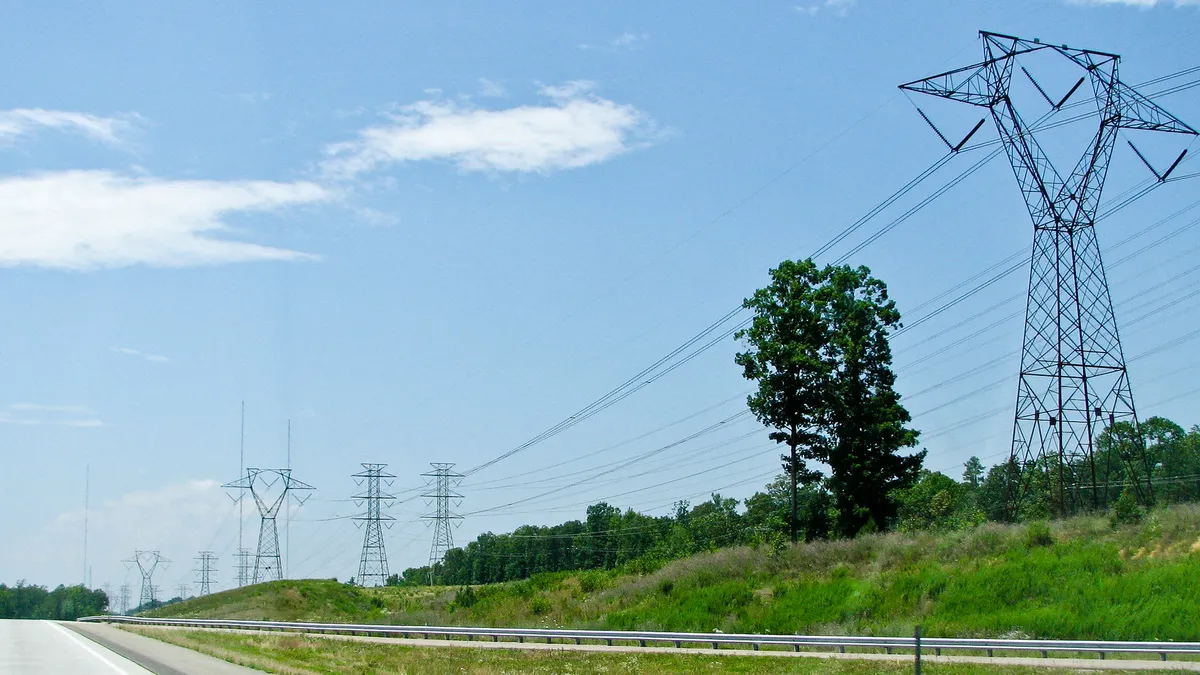U.S. electric utilities have increasingly ambitious goals, and Commonwealth Edison is no different. Its parent company, Exelon, supports Illinois' push for 100% clean energy. But like most of the country it has been laser-focused on meeting the challenges of the current pandemic.
Utility Dive spoke recently with ComEd President and Chief Operating Officer Terry Donnelly, who said priorities like social distancing "quickly became apparent."
ComEd serves the Chicago area in addition to rural parts of northern Illinois, and worked with many stakeholders to help flatten the curve of infection among its employees. One of the first outbreaks of the novel coronavirus in the U.S. took place in Chicago, requiring the utility to react early on.
One focus for the utility has been to secure temporary vehicles so field workers can have one vehicle per employee, "to allay employee concerns" about social distancing, Donnelly told Utility Dive.
ComEd had rented more than 400 additional vehicles to permit job site travel for employees, in addition to allowing the use of personal vehicles to access job sites, and reimbursing for mileage. Other Exelon utilities are taking similar steps.
"I think we've got some stability now, using those vehicles," Donnelly said, looking ahead to necessary field work and preparation for the summer peak.
Utility worker concerns
"The summer's coming down on us pretty fast and we're in a very challenging time for customers and the duress that they're under to make sure we're prepared for that high stress period," Donnelly said.
Such anticipation means ComEd is focused on lowering absenteeism and protecting its employees to ensure more work can get done, he said. In addition to the one employee per truck rule, ComEd is staggering shifts and working through virtual huddles to keep work going.
Local chapters of the Utility Workers Union of America have asked for separate employee access to vehicles and increased protections against COVID-19, but riding in different cars doesn't help if employees must ultimately work in close quarters, union president Jim Slevin told Utility Dive.
"Some job sites, because you need two visuals on things, there's a different alignment" that does not allow for proper social distancing, he said. "We may have to think of different configurations for those control rooms so that everybody is at least six feet from each other."
"As we look at going through the summer in a COVID world, we're working more aggressively on crew separation, staggered shifts, having crew units that are generally together most of the time, and keeping them together as much as possible," Donnelly said.
While risks from riding in trucks together can be decreased by rolling down windows, employees working in close quarters must use N95 respirator masks to best protect themselves against chances of infection, according to Andrew Goodman, clinical professor of NYU's School of Global Public Health.
In some instances, the personal protective equipment (PPE) must be a top priority for utility employers as an N95 respirator mask is a "much higher level of protection" when employees cannot social distance, he told Utility Dive.
ComEd employees at this time have access to PPE, based on the utility's "detailed prioritization plan" for equipment, Donnelly said.
"We have access to supplies of N95 masks for those employees who need them, and our employees are most commonly using KN95 and surgical masks," the versions of N95 masks manufactured in China, Paul Elsberg, utility spokesperson, said.
ComEd is also working with local alcohol distilleries to create their own hand sanitizer to ensure a supply for employees.
"Where there's a will, there's a way," Donnelly said of the partnership with distilleries.
Hiring continues amid COVID-19
Utilities like ComEd are prepared to continue hiring, even in the face of the economic downturn. In fact, Donnelly said, hiring has been a utility priority due to an aging workforce.
"We have a pretty aggressive workforce growth replenishment [plan] that's been going on for the last decade," he said.
Utilities are understaffed across the country, Slevin said, and "at the height of the COVID side of it, you know, the concern of the aging workforce and making sure they're not exposed to it … has to get addressed."
Under pandemic conditions, "people are going to want to leave the workplace or maybe they're just exhausted of what's going on and want to just enjoy their golden years," he said.
"We have canceled a fair amount of training that can be considered not urgent [and] may put off 'refresher' training one year," Donnelly said, but "we have kept our hiring going."
ComEd is certifying employees in progression and implementing social distancing at company-run schools.
ComEd hiring is also, in part, focused on the call center staff, on-the ground and construction employees that are needed to help prepare for summer demand. The utility must be prepared to meet high summer demand and hone utility storm processes, Donnelly said.
The utility is currently hiring construction workers into more of the entry-level positions and is "bringing in more call center folks during the summer," Donnelly said. For the first time, ComEd has also deployed some call center employees to work remotely.
Other Exelon utilities are also postponing refresher training, according to Elsberg. Required training that the utilities previously offered in a classroom environment is also transitioning online and virtual training, or reducing class sizes and using larger classrooms to allow for social distancing.
Utility aid
Donnelly credited Illinois utility regulators for working with the company on its pandemic preparations. In addition, the utility can access national resources, including assistance from the Federal Energy Regulatory Commission.
"FERC has tried to provide regulatory flexibility so that the utilities can focus on their business operations without FERC standing in the way or being prescriptive," Andrea Wolfman, of counsel in Davis Wright Tremaine's energy practice group, told Utility Dive via email.
On May 14, FERC announced resources for pandemic plans and recovery activities, in conjunction with the Department of Energy, the North American Electric Reliability Corporation and the North American Transmission Forum.
While national resources are available, utilities are looking for cues on a more local level to secure their workforces. For example, many look to local jurisdictions regarding the implementation of more extreme actions, like sequestering operational personnel onsite.
ComEd has not had to "pull the trigger" on its employee sequestration plans and is waiting to see what additional actions the Illinois governor or Chicago mayor might take, Donnelly said. The utility has planned extensively for the potential need to keep control room employees onsite if COVID-19 cases grow exponentially in its service area.
Chicago and the surrounding northern counties are the epicenter of COVID-19 infection in Illinois as a densely populated urban area.
As of March 19, COVID-19 cases were doubling in Chicago every two days. By May 15, cases were doubling every 24 days, according to a Friday report from the Chicago Department of Public Health.























